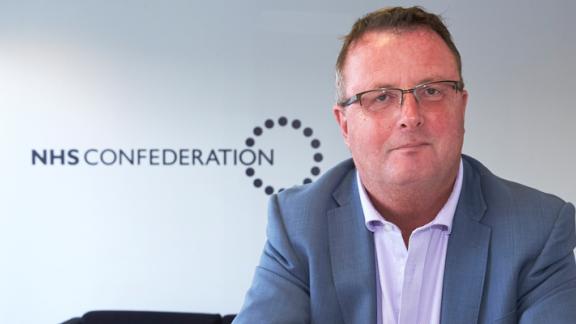World Mental Health Day: a new start for integrated care systems

There is no part of the NHS that does not have an impact on our mental health, writes Andy Bell of Centre for Mental Health. World Mental Health Day can be an opportunity for recently established integrated care systems, boards and partnerships to consider whether they are yet doing enough to support mental health in their local areas and communities.
World Mental Health Day is often used as an opportunity for important discussions about how we all look after our mental health and to tackle myths, misperceptions and prejudices about mental illness. But, it is also a chance for recently established integrated care systems, boards and partnerships to ask themselves whether they are yet doing what they can to support mental health in their local areas and communities.
It's a truism to say that we all have mental health, but it is a cliché with a vital message for system leaders. Too often in previous health and care system arrangements, mental health was on the margins of decision-making, falsely regarded as a ‘single condition’ rather than a wide spectrum of human experience affecting everyone’s health and wellbeing, and people with mental health needs were not (and are still not) able to expect the same standards of care as those with physical conditions.
Change can start today
Integrated care boards and partnerships can change that. Starting today, they can take the many opportunities that are available to them to turn the slogan of parity for mental health into a reality in the communities they serve. Every integrated care board has been given a clear mandate in the Health and Care Act to take steps to reduce inequalities in the health of their local population and to ensure that mental and physical health are given equal importance in their decision-making processes.
There is no part of the NHS that does not have an impact on our mental health
A good place to start is to think of mental health as truly being ‘everyone’s business’. There is no part of the NHS that does not have an impact on our mental health. Anyone being treated for a long-term physical condition faces twice the average risk of a mental health condition such as depression or anxiety. If their treatment does not consider their mental health, if their clinicians are not able to ask how they are (genuinely), and if they cannot get help for their emotional needs alongside their physical needs, we know that their outcomes are poorer, their lives are much harder, and the costs of their treatment are far greater. Ensuring mental health support is embedded in all long-term conditions pathways can make a big difference, and integrated care systems are ideally placed to make that change from today.
Fair funding for mental health services
It’s also crucial that integrated care systems ensure fair funding for mental health services. The much-debated backlog in elective care is mirrored in long waits and high thresholds for mental health care for children and adults alike. And mental health services do not always serve as well as they should the most disadvantaged, most marginalised and most vulnerable groups of people. Integrated care boards can change this. They can embrace the opportunity created by the NHS Long Term Plan to rebuild primary and community mental health services, to boost social care and housing support, and to improve crisis and inpatient care so that no one is left with inadequate or unsafe care when they most need it. And by taking concerted action they can reduce the 15-20 year life expectancy gap that continues to shorten the lives of people with a long-term mental illness.
Integrated care boards and partnerships can … look beyond the health and care system to create the conditions for better mental health in their communities
Integrated care boards and partnerships can also look beyond the health and care system to create the conditions for better mental health in their communities. By using the economic power of the NHS and local government, they can invest in their local areas, pay the living wage to all of their workers, and tackle some of the biggest drivers of poor mental health in our society. Poverty, exclusion and racism cause untold harm to people’s mental health. Where people have enough money to live on, in warm homes and safe neighbourhoods, their mental health improves, and as a result they have better physical health, too. Integrated care systems can make an impact on the determinants of health, using their influence and their voice to champion better health for all.
World Mental Health Day is one day. But it can prompt action that brings about real change in people’s lives and in the places we live and work. Integrated care systems now have a chance to make it count: to create healthy communities, to turn the tide on health inequalities and to give everyone a better chance of good mental health throughout life.
Andy Bell is deputy chief executive of Centre for Mental Health. You can follow Andy on Twitter @andy__bell__



